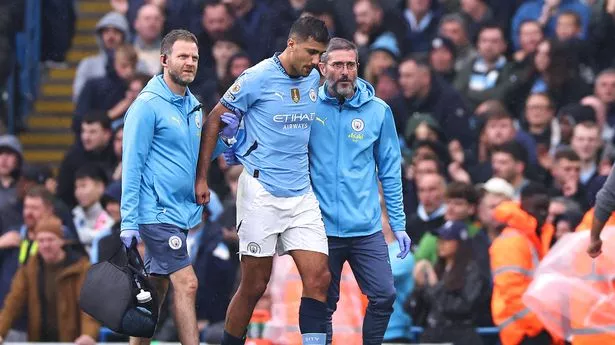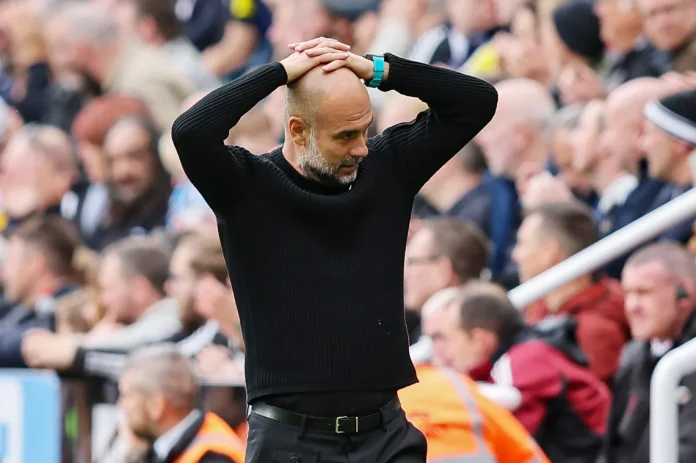Pep Guardiola, Manchester City’s legendary manager, is known for his strategic brilliance and attention to detail, but lately, he has been vocal about a different challenge: the relentless football schedule. After Manchester City faced two consecutive losses within a span of four days, Guardiola has expressed frustration, comparing his team’s schedule to that of the NBA — but with a stark difference. While NBA players enjoy a four-month offseason, Premier League players, according to Guardiola, barely get three weeks of recovery time before diving into another demanding season.
The recent back-to-back losses against Tottenham in the League Cup and Bournemouth in the Premier League have compounded Guardiola’s concerns. With key players sidelined by injuries, including Ballon d’Or winner Rodri, Kevin De Bruyne, John Stones, and Kyle Walker, Guardiola is now openly addressing the toll that such a packed schedule takes on his squad. As Manchester City prepares for their upcoming Champions League clash against Sporting Lisbon, Guardiola’s comments raise questions about the impact of an intense football calendar on player health, team performance, and long-term success.
Guardiola’s Comparison to the NBA: A Stark Contrast
In discussing the impact of an intense schedule, Guardiola drew a comparison to the NBA, a league known for its rigorous schedule of 82 games. “Maybe when we go to the World Club Cup and reach the last stages, we’re going to play more than 70 games,” Guardiola stated. “And 70 games is like the NBA, but the NBA has four-month holidays, and we have three weeks.” This comparison underscores Guardiola’s frustration and highlights a significant issue facing top-tier football teams.
The NBA’s structure includes an extensive offseason that allows players ample time to recover, recharge, and address injuries. In European football, however, the calendar leaves little time for recuperation, especially for teams competing in multiple tournaments. The lack of a substantial offseason puts immense physical strain on players, making them more vulnerable to injuries. According to Guardiola, this issue isn’t confined to the current season; it’s a cumulative problem stemming from the demands of previous seasons.
Manchester City’s Injury Concerns
The strain on Manchester City’s squad has been evident in recent weeks, with several key players sidelined by injuries. Among the most notable is Rodri, the recent Ballon d’Or winner, who is out for the remainder of the season. This loss is a significant blow, given Rodri’s influence on the field and his role in City’s tactical setup. Similarly, Kevin De Bruyne, another pivotal player, has only managed one appearance since September, severely impacting the team’s creativity and midfield strength.

In addition to Rodri and De Bruyne, defensive stalwarts John Stones and Kyle Walker, along with star midfielder Phil Foden, have all faced injuries that kept them out of action. Guardiola’s frustration is understandable, as managing a team becomes increasingly challenging when vital players are unavailable. The recurring injuries are a testament to the toll that non-stop competition can take on athletes, highlighting the need for more substantial breaks between seasons.
Guardiola’s Call for Attention to Player Well-Being
Guardiola’s recent comments reflect a growing sentiment among managers regarding player welfare. With an increasing number of games, football has become a year-round commitment, offering players little time to fully recover between seasons. Guardiola emphasized this point by saying, “It’s not just this season. It comes from the previous season, the previous season, the previous season… When that happens, you have injuries for a long time.” This observation highlights the accumulated fatigue that players experience due to the relentless schedule.
For Guardiola, the problem isn’t just physical; it’s also about the mental toll that such a packed calendar takes on players. Constant competition with minimal rest can lead to burnout, affecting players’ performance and motivation. Guardiola’s comments serve as a call to action for football’s governing bodies to reevaluate the current schedule and consider implementing changes that prioritize player well-being.
READ NEXT:
- ‘We only have 13 players, we are in trouble’:Manchester City Manager Pep Guardiola Troubled By Injury Issues
- Urgent Transfer Push: Real Madrid Eyes Trent Alexander-Arnold After Carvajal’s Devastating Injury
- UEFA Chief Ceferin Hits Back at Fixture Complaints: ‘It’s the High-Earning Players Who Are Complaining’
A Player’s Perspective: Overcoming Physical Challenges
The grueling schedule has led to an increasing number of players pushing through minor injuries to remain on the field, as highlighted by Guardiola’s mention of Manuel Akanji and Nathan Ake. Ahead of the recent games, Guardiola explained, “There are players that are not in the best way, and they make an incredible effort to be here. Manu [Akanji] and Nathan [Ake] were not in really good condition, so until the last moment, I didn’t know Nathan could play, but he said: ‘No, I want to try, I want to try.’”
This dedication from players to perform despite physical discomfort underscores the mental resilience required in elite football. However, relying on players to push through injuries is not sustainable, as it can worsen their conditions and lead to longer recovery times. Guardiola’s comments reveal a culture where players are encouraged, and even expected, to play through pain — a practice that could lead to serious health risks over time.
Potential Solutions to the Fixture Congestion Problem
Guardiola’s concerns bring attention to potential solutions for addressing fixture congestion. One option is to reduce the number of domestic cup competitions or shorten international tournaments to allow players more rest time. Another consideration could be expanding squad sizes to allow for better rotation, giving players adequate rest without compromising team performance.
Media error: Format(s) not supported or source(s) not found
Download File: https://jambobet.news/wp-content/uploads/2024/11/AQOO32K48V8G_BzG7WrpVGvZ8DC-PujWYOCR1xH1DtCtqd6_cQNG1RxA9-3IyliM62p2-b8AGfjuBnKB-MOT_WH-1.mp4?_=1Furthermore, a mandatory offseason rest period, similar to the NBA’s model, could be implemented, giving players a more structured break to recover. By implementing these changes, football could take significant steps toward reducing the physical toll on players and enhancing the overall quality of play.
Guardiola’s Call to Governing Bodies: Time for Change?
Guardiola’s remarks come at a time when more managers are joining the conversation about player welfare. With the expansion of tournaments, such as the World Cup, and the inclusion of more international friendlies, players are facing unprecedented levels of fatigue. Guardiola’s comparison to the NBA highlights the disparity in recovery time and raises questions about whether football can continue to maintain its current pace without consequences.
Football’s governing bodies have a responsibility to listen to the concerns of managers like Guardiola, who have firsthand experience with the challenges posed by the crowded fixture schedule. If the sport is to continue growing, a balance must be struck between providing exciting, high-stakes matches and ensuring that players’ health is protected.
Guardiola’s Frustration Reflects a Broader Issue in Football
Pep Guardiola’s frustration with the packed football schedule sheds light on a broader issue within the sport. With Manchester City facing a series of injuries and challenging fixtures, Guardiola’s comments reflect a genuine concern for player welfare. His comparison to the NBA underscores the need for football to adopt a more balanced approach that allows players sufficient time to recover.
As Guardiola and other high-profile managers continue to speak out, the conversation around fixture congestion is likely to gain momentum. It is essential for football’s governing bodies to address this issue, not only to protect players’ health but also to ensure that fans continue to enjoy high-quality performances. For now, Guardiola and Manchester City will forge ahead in the face of challenges, but his message remains clear: without changes to the schedule, player health and the quality of the game may suffer in the long run.


